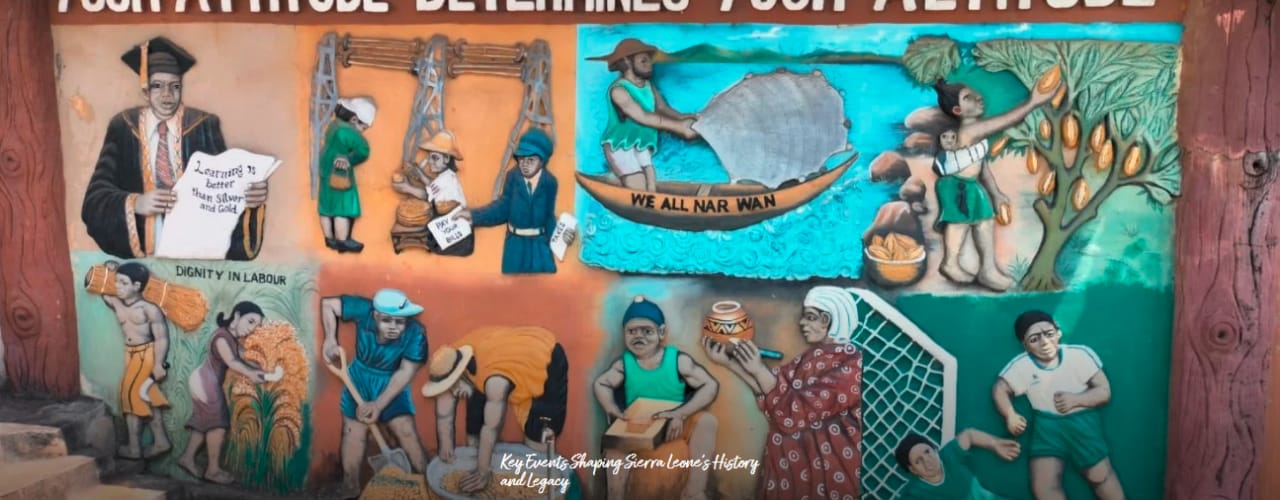Key Events Shaping Sierra Leone’s History and Legacy

Sierra Leone is a land of rich history, cultural diversity, and resilience. Its story spans thousands of years, from early human settlements to a modern nation overcoming challenges to build a brighter future. Each chapter of Sierra Leone’s history has left an indelible mark, shaping its identity and legacy.
Here’s a closer look at some of the pivotal events in Sierra Leone’s history and their lasting impact on the nation.
1. The Arrival of European Colonizers – 15th Century
In 1462, Portuguese explorer Pedro de Sintra became the first European to chart the coast of what is now Sierra Leone. He named the region “Serra Leoa,” meaning “Lion Mountains,” after the rugged hills near the Freetown Estuary.
The area quickly gained importance in the transatlantic trade, serving as a strategic base for European ships to shelter during storms and replenish supplies. This early contact set the stage for centuries of European involvement in Sierra Leone’s affairs, with profound consequences for its people and resources.
2. The Transatlantic Slave Trade – 16th to 19th Century
During the 16th century, Sierra Leone became a key hub for the transatlantic slave trade. Thousands of Africans were captured, enslaved, and transported across the Atlantic, many passing through Bunce Island, a notorious slave-trading post near the Sierra Leone River.
This dark period devastated local communities, stripping the region of its people and resources. The abolition of slavery in the early 19th century marked a turning point, but the scars of the slave trade remain deeply ingrained in Sierra Leone’s history.
3. The Founding of Freetown – 1787
In 1787, British abolitionists established Freetown as a settlement for freed slaves. The city was a beacon of hope for enslaved Africans who had fought for the British during the American Revolutionary War and were promised freedom in return.
Freetown’s founding cemented Sierra Leone’s identity as a land of freedom and refuge. The freed settlers and their descendants, known as the Krio people, became an influential community, blending African and Western traditions. Today, the Krio culture remains a vital part of Sierra Leone’s social and cultural fabric.
4. Sierra Leone’s Independence – 1961
After decades of British colonial rule, Sierra Leone achieved independence on April 27, 1961. Sir Milton Margai became the country’s first Prime Minister, leading the transition to self-governance.
Independence was a moment of pride and hope for Sierra Leoneans, marking the beginning of a new era. However, the challenges of nation-building, political instability, and economic struggles soon followed, shaping the post-independence journey.
5. The Civil War – 1991 to 2002
One of the most harrowing chapters in Sierra Leone’s history was the Civil War, which erupted in 1991 and lasted for over a decade. The conflict, fueled by corruption, economic disparity, and control over diamond resources, led to immense suffering.
By the war’s end in 2002, an estimated 50,000 people had died, millions were displaced, and the country’s infrastructure lay in ruins. Despite this devastation, Sierra Leone emerged as a symbol of resilience. The nation embarked on a remarkable journey of peacebuilding and reconciliation, becoming a model for post-conflict recovery.
Lessons from Sierra Leone’s History
Sierra Leone’s history is a testament to the strength and determination of its people. From the tragedies of the transatlantic slave trade to the triumph of independence and the resilience shown after the Civil War, the country has continually risen from adversity.
Today, Sierra Leone stands as a vibrant nation with a rich cultural heritage, striving for progress and unity. Its history is not just a chronicle of past events but a foundation for building a brighter future.
As we reflect on these key events, we are reminded of the importance of preserving history and honoring the resilience of those who shaped it. Sierra Leone’s journey is far from over, but its legacy is one of hope, strength, and the enduring spirit of its people.
